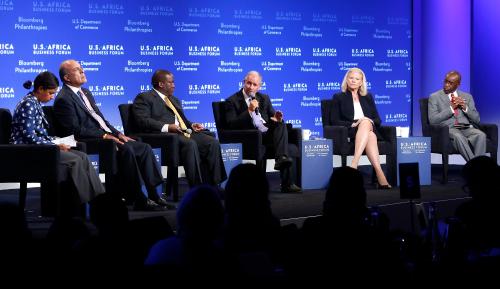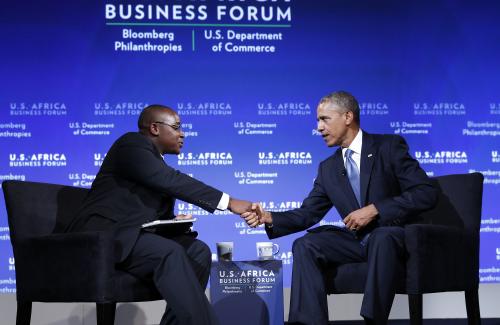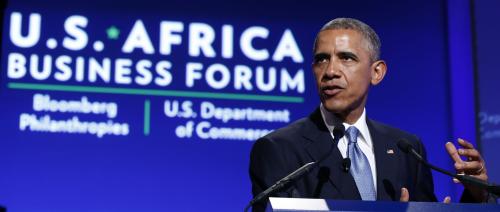Editor’s Note: On September 21, the Department of Commerce and Bloomberg Philanthropies are hosting the second U.S.-Africa Business Forum. Building on the forum in 2014, this year’s meeting again hosts heads of state, U.S. CEOs, and African business leaders, but aims to go beyond past commitments and towards effective implementation. This year’s forum will focus on seven sectors important to African economies and which offer opportunities for investors, namely finance and capital investment, infrastructure, power and energy, agriculture, consumer goods, and information communication technology. The below piece reviews the theme of finance and capital investment as an opportunity for investment on the African continent.
While the numbers show that the United States has been a leader when it comes to investment on the African continent, those numbers can be deceiving, and countries such as China are fast on American heels. Yes, in 2014 the U.S. was the second-largest investor (after the United Kingdom) in terms of FDI stock in Africa (including North Africa) at $64 billion—up from $44 billion in 2009 (according to the 2016 World Investment Report by UNCTAD). Yes, according to Ernst & Young’s 2016 Africa Attractiveness Survey, the U.S. has been the largest investor on the continent in terms of the number of greenfield foreign direct investment (FDI) projects in 2015.
Yes, this investment is growing. At the close of the 2014 U.S.-Africa Business Forum, $33 billion in investments in Africa was announced. In addition, the Overseas Private Investment Corporation (OPIC) reports that development finance institutions—which aim to catalyze private capital for development with products such as direct loans and guaranties, political risk insurance, and support for investment funds—are rapidly growing. According to OPIC, “development finance institutions altogether are estimated to be financing about $70 billion per annum, which is more than half of ODA [official development assistance], and more than ODA if one counts the private capital that accompanies that finance.” In 2014, in sub-Saharan Africa alone, OPIC had commitments of $768 million—one-quarter of all its commitments. So far, OPIC has also committed to provide $1.5 billion of financing and insurance for Power Africa projects over the next five years.
Yet, despite these numbers, only 0.7 percent of the U.S.’s global FDI stock abroad went to the region in 2012. Notably, though, there has been a shift within that investment toward diversification and away from extractive industries, probably due to the drops in commodity prices. Between 2005-2015, the number of FDI projects that are “consumer facing” have jumped from a 33.4 percent share to 44.7, while extractives have dropped from 26.9 percent to 5.8. The share of value in FDI has followed a similar trend. Then again, extractive industries still make up a large part of U.S. investment on the continent. In comparison, according to Brookings Senior Fellow David Dollar, “Chinese investment is attracted to natural resource wealth, but only modestly more so than Western investment.”
What can be done? Thankfully, according to U.S. Deputy Secretary of Commerce Bruce Andrews, while the 2014 U.S.-Africa Business Forum “answered the question, ‘Why Africa?’ This year, we will answer the question, ‘How?’ How do you effectively do business in Africa? How can we grow partnerships between U.S. and African companies? How do we spur trade, investment, and job creation between our two continents?”
So, as investors and heads-of-state convene in New York on September 21, they should continue to look into solutions to mitigate the perception of and the actual risk of investing in the continent. Mutually beneficial bilateral investment treaties— low-cost options to encourage business climate reform while simultaneously signaling investor commitment to host countries and providing them with policy space to design and implement their development agendas—provide an opportunity to make African countries more attractive. “Blended initiatives” such as Power Africa also attract private capital. African policymakers should focus on attracting more diversified investments in order to prevent an overreliance on extractive industries, which creates vulnerabilities when it comes to resource prices. They should also look to strengthen institutions and improve the rule of law to become more attractive to investors as well as incentivize investors to provide jobs, knowledge, and skills transfer for Africa’s long-term growth.








Commentary
The US-Africa Business Forum: Increasing finance and capital investment
September 19, 2016